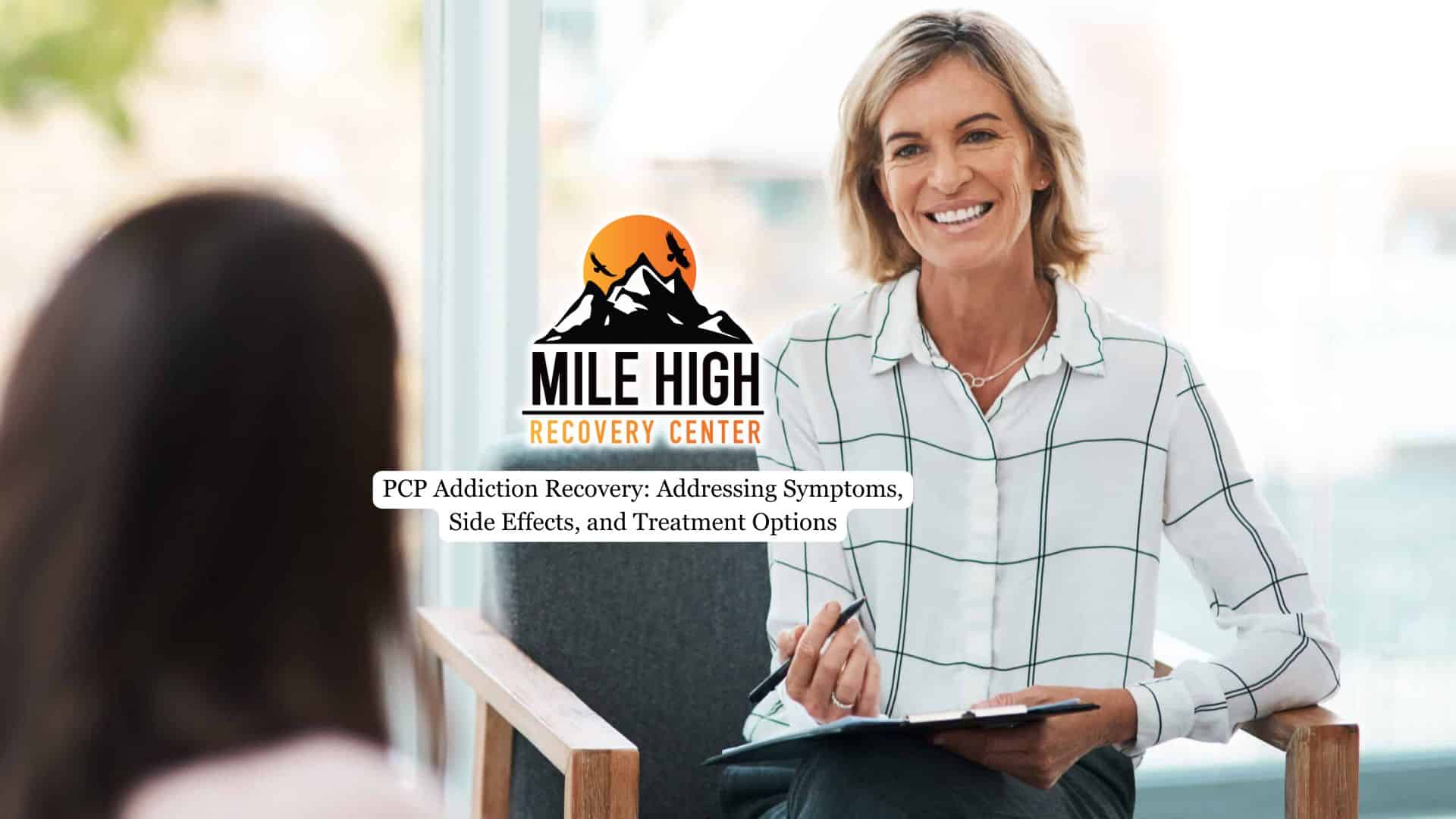PCP, also known as phencyclidine, is a hazardous and extremely habit-forming hallucinogenic substance that significantly affects both the mind and body. Initially created as an anesthetic, its use was halted because of serious adverse effects, yet it continues to be a drug of abuse in the present day.
This article aims to showcase the entire range of PCP addiction recovery, including identifying symptoms, comprehending the drug’s side effects, and investigating research-based treatment options.
What is PCP?
PCP is a dissociative anesthetic that distorts your perception and induces feelings of detachment from your surroundings and self.
Developed in the 1950s as a surgical anesthetic, it was discontinued for human use due to severe side effects and is now primarily used in veterinary medicine.
You’ll often find PCP as a white crystalline powder, which can be ingested through smoking, snorting, injecting, or swallowing.
It blocks the NMDA receptor for glutamate, causing significant changes in sensory perception, mood, and behavior, frequently resulting in hallucinations and disorientation.
PCP addiction is a serious issue, as the drug is illegally sold under street names like “angel dust,” “wack,” and “embalming fluid.”
Why is PCP Addictive?
The addictive nature of PCP stems from its ability to profoundly alter brain chemistry by blocking glutamate receptors, disrupting normal neurotransmission and leading to intense euphoria and hallucinations that compel repeated use.
The drug’s effects can create a powerful psychological dependence, as you may seek to recapture the altered states of perception and dissociation experienced during use.
Other factors contributing to the risk of addiction include genetic susceptibility, with 40-60% of individuals predisposed to substance use disorders, and environmental influences, such as peer pressure and drug availability.
Chronic PCP use can lead to tolerance, meaning you’ll require larger doses to achieve the same effects, further entrenching addiction and increasing the risk of severe withdrawal symptoms upon cessation.
Common Causes of PCP Addiction
Genetic factors play a significant role in determining an individual’s risk for PCP abuse, with those who have a family history of substance abuse being more susceptible.
Environmental influences, such as being raised in a household where drug use is common or experiencing trauma, neglect, or peer pressure, can drive individuals to use substances like PCP as a means of coping.
Exposure to PCP or other substances during adolescence increases the likelihood of addiction, as the developing brain is particularly vulnerable during this period.
Psychological factors, including untreated mental health conditions such as depression, anxiety, or post-traumatic stress disorder (PTSD), also contribute to PCP addiction, as individuals may use the drug to temporarily alleviate emotional distress.
Side Effects and Symptoms of PCP Addiction
Physical Symptoms
The physical symptoms of PCP addiction include numbness, dizziness, muscle rigidity, and lack of coordination, which can greatly affect your ability to perform daily tasks and maintain overall physical health.
Chronic use of PCP can result in severe weight loss and neglect of personal hygiene, as you may become increasingly isolated and disengaged from regular activities.
You may also experience gastrointestinal disturbances such as nausea, vomiting, and diarrhea, further exacerbating the drug’s physical impact on your body.
Psychological Effects of PCP Use
You may experience intense hallucinations, paranoia, anxiety, and disorganized thinking, along with cognitive impairments like memory problems, difficulties with speech and reduced attention span.
Prolonged PCP use can lead to significant mood disorders, including depression and suicidal thoughts, as well as detachment from reality that complicates your mental state and increases the risk of dangerous behaviors. Withdrawal from PCP is often marked by pronounced psychological symptoms, such as cravings, irritability, erratic behavior, and difficulty concentrating, which can persist for several weeks.
Long-term effects may include persistent anxiety, auditory hallucinations, and an increased risk of developing other mental health conditions.
Behavioral Indicators
You may exhibit erratic behavior, including aggression, social withdrawal, and unpredictable actions that pose risks to both yourself and others. Disorientation and impaired judgment often lead to dangerous or violent situations.
You may isolate yourself, neglecting personal care and responsibilities, resulting in changes to your physical appearance and weight loss.
The compulsive nature of PCP addiction can lead to continued use despite adverse social, legal, and health consequences, indicating a severe psychological dependency that requires comprehensive treatment to address the behavioral and psychological aspects of recovery.
Withdrawal Symptoms
Withdrawal symptoms typically begin within hours to days after your last use and may last up to two weeks, peaking in intensity early on. You may experience physical discomforts like muscle aches, tremors, sweating, nausea, and increased heart rate.
However, the psychological effects of withdrawal are often more pronounced, featuring intense cravings, depression, anxiety, and irritability. As a chronic user, you might face ongoing mental health issues and sleep difficulties even in the later stages of withdrawal.
Detoxification under medical supervision is crucial, as navigating withdrawal alone can be difficult and potentially dangerous.
Long-term Consequences of PCP Addiction
Chronic PCP use can cause significant damage to the central nervous system, leading to memory loss, impaired cognitive function, and difficulty concentrating. Many users also experience persistent speech problems, such as slurring or stuttering, even after they stop using PCP.
The mental health effects are equally devastating, with prolonged PCP abuse often causing anxiety, depression, paranoia, and psychotic symptoms that can resemble schizophrenia. These psychological issues may linger long after the drug is discontinued, resulting in social withdrawal and an increased risk of suicidal thoughts.
Physically, long-term PCP use can damage organs, including the kidneys and liver, as well as cause cardiovascular complications such as hypertension and arrhythmias. Chronic users are also at a higher risk for malnutrition, weight loss, and weakened immune function, which makes them more vulnerable to infections.
On top of all, PCP addiction significantly increases the risk of PCP overdose, which can cause life-threatening complications such as seizures, respiratory depression, and coma.
Beyond health issues, PCP addiction involves social consequences like strained relationships, job loss, legal problems, and a diminished quality of life.
Comprehensive Assessment and Diagnosis
A thorough evaluation and diagnosis of PCP addiction are crucial for developing a personalized treatment plan that addresses the individual’s specific needs.
The process starts with a physical examination to evaluate the person’s general health and identify any medical issues resulting from PCP use, such as signs of dependence or previous PCP overdose. Next, a psychological assessment is conducted, concentrating on the severity of addiction, co-occurring mental health conditions, and the impact of PCP on cognitive abilities and emotional well-being.
Social evaluations are also performed to gain insight into the individual’s family relationships, work or school functioning, and peer interactions, offering a comprehensive understanding of their situation.

Treatment Options for PCP Addiction
PCP addiction treatment encompasses the following phases:
Detox Process
Given the severe and potentially fatal effects of PCP withdrawal, such as seizures, hallucinations, and agitation, detoxification should always be carried out under medical supervision in a professional environment. Medically monitored detox programs offer 24/7 care, ensuring physical stability and addressing psychological distress, including anxiety and depression.
Although the timeline for PCP detox varies based on factors such as the severity of addiction and frequency of use, withdrawal symptoms generally persist from a few days to two weeks, with some psychological effects lasting longer.
Medications may be administered to alleviate discomfort, such as benzodiazepines for agitation or antipsychotics for hallucinations. This structured approach not only minimizes the risk of relapse during the vulnerable detox phase but also prepares individuals for subsequent rehabilitation and long-term recovery efforts.
Behavioral Therapy
Cognitive Behavioral Therapy (CBT) is highly effective in helping individuals identify and change negative thought patterns and behaviors associated with PCP use. By teaching coping strategies to manage triggers and stressors, CBT reduces the risk of relapse while promoting emotional resilience and healthier decision-making.
Dialectical Behavioral Therapy (DBT) is another valuable approach, particularly for individuals struggling with addiction and mental health disorders. DBT combines mindfulness practices with techniques for emotion regulation, distress tolerance, and interpersonal effectiveness, equipping individuals to manage intense emotions and improve relationships.
Therapies such as contingency management use positive reinforcement to motivate sobriety, while motivational interviewing enhances readiness for change in those hesitant about treatment.
Inpatient vs. Outpatient Rehab
Choosing the right substance abuse treatment for PCP is a crucial decision in your PCP addiction recovery journey, that’s it should be done with the help of professionals.
Inpatient rehab provides a highly structured setting with round-the-clock medical and therapeutic support, making it well-suited for individuals grappling with severe addiction, co-occurring mental health disorders, or the long-term consequences of PCP use. This immersive approach eliminates external triggers, allowing patients to concentrate fully on recovery while addressing issues related to PCP through intensive therapies and support.
Conversely, outpatient rehab offers greater flexibility, enabling individuals to continue residing at home and managing daily responsibilities while attending therapy sessions. Outpatient programs are frequently recommended for those with milder addictions or a robust support system at home.
Both options incorporate evidence-based treatments to tackle substance abuse and mental health challenges, assisting individuals in taking the first step toward lasting recovery. Selecting the appropriate program depends on the individual’s circumstances and commitment to overcoming PCP addiction.
Medication-Assisted Treatment (MAT)
Medication-Assisted Therapy (MAT) is essential in treating PCP addiction, as it helps individuals manage withdrawal symptoms and stabilize their mental health during recovery. Although there are no FDA-approved medications specifically for PCP addiction, healthcare professionals often use supportive medications to address the hallucinogenic effects and psychological challenges associated with the drug.
For instance, antipsychotics like haloperidol may be prescribed to alleviate severe agitation and psychotic symptoms, while mood stabilizers such as lithium can help regulate emotional irregularities. Benzodiazepines are sometimes used cautiously to reduce intense anxiety during withdrawal.
The National Institute on Drug Abuse (NIDA) states that combining medications with behavioral therapies significantly improves treatment outcomes by addressing both the physical and psychological aspects of addiction. MAT provides a comprehensive approach that not only reduces cravings and withdrawal discomfort but also supports mental health treatment, paving the way for long-term recovery from PCP addiction.
Holistic Approaches
PCP addiction can have profound effects on an individual’s cognitive functions, emotional stability, and social relationships. To address these challenges, holistic treatment methods aim to restore balance and promote overall well-being.
Techniques like yoga and meditation are effective tools for managing stress and improving self-awareness, which can help counteract the long-term effects of PCP addiction, such as anxiety, depression, and cognitive impairments.
Creative therapies, including art and music therapy, provide outlets for emotional expression and healing, allowing individuals to process their experiences in a safe and supportive environment.
Adventure therapy encourages personal growth through confidence-building activities, helping individuals develop the skills and resilience needed to maintain long-term recovery.
Relapse Prevention and Aftercare
Maintaining sobriety after completing a PCP addiction treatment program requires ongoing effort and vigilance. Relapse prevention strategies are essential, helping you identify triggers, develop coping mechanisms, and build a strong support network.
Engaging in aftercare programs, such as ongoing therapy, support groups, and regular check-ins with healthcare providers, plays a vital role in staying sober and addressing emerging challenges. Studies show that participating in aftercare reduces the likelihood of relapse, emphasizing the importance of continuous engagement in recovery resources post-treatment.
Family and Social Support
Family therapy sessions help rebuild trust, improve communication, and address dysfunctional dynamics that may have lead to addiction. Families can act as accountability partners, ensuring their loved ones adhere to treatment plans and avoid triggers that could lead to relapse. Social support networks, such as peer groups and community programs, further reinforce recovery by offering shared experiences and emotional backing.
Challenges in PCP Addiction Treatment
Treating PCP addiction presents significant challenges due to the complex ways in which PCP affects both the mind and body, particularly in adolescents and young adults. This demographic is especially vulnerable because of ongoing brain development and a higher propensity for risk-taking behaviors, which can exacerbate the drug’s impact on cognitive function, emotional regulation, and decision-making.
Many individuals turn to PCP as a way to escape stress or trauma, but this coping mechanism often leads to severe psychological dependence and long-term health issues.
Hallucinations, paranoia, and aggressive behavior may require immediate medical attention, complicating the initial stages of recovery.
Withdrawal can lead to intense cravings, anxiety, depression, and erratic behavior, making it difficult for individuals to remain committed to treatment. The lack of approved medications for PCP addiction means relying on behavioral therapies and psychosocial support, which can vary in effectiveness.
On top of all, stigma surrounding addiction and mental health can deter people from seeking help, making it difficult for them to take the first step towards recovery.
Final Thoughts from Mile High Recovery Center
At Mile High Recovery Center, people struggling with PCP addiction can find a safe and structured environment that promotes inner healing and long-term sobriety. Through our center’s residential addiction treatment program in Denver, Colorado, clients in need of substance abuse and mental health services can benefit from evidence-based therapies, personalized care plans, and a welcoming community that values connection over judgment.







